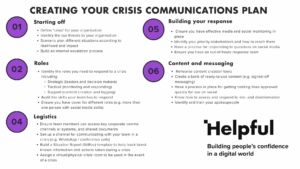How can I prepare for a crisis?
The best time to prepare for a crisis is when you’re not already dealing with one. Obvious, right? But what should your crisis communications planning involve?
While you can try and plan out all the potential crises and risks you might face in your organisation and develop statements for every eventuality, it’s highly unlikely you’ll cover everything. In fact, trying to plan everything ahead of time can lead to excessively-detailed plans which people can’t actually get to grips with when a crisis strikes.
It’s smarter to ensure you’ve got the team and process in place to respond quickly when needed.
What should a crisis communications plan cover?
Our downloadable guide to creating your crisis communications plan (PDF) sets out five areas to work on:
- Initiation: definitions, risks and escalation process appropriate to your team
- Roles: the strategic, tactical and support skills you need to cover the work of managing a crisis response
- Logistics: how you’ll work together as a virtual or co-located team
- Building your response: the key stakeholders and monitoring processes you’ll use
- Content and messaging: the tools and template elements you’ll be able to reach for quickly
Take a look and explore the useful links we’ve added under each heading for more advice and examples.
How can I test my crisis communications process and crisis team?
It’s important to have the process, tools and templates in place first, and use these as the basis for training your team on how to apply them to different situations. Scenario-based workshop training is a good place to start, helping the group to understand good practice alongside how to apply those principles in different situations.
Then, you’ll want to stress-test the team’s ability to put things into practice under pressure – maybe as a crisis simulation exercise or emergency drill, to validate their readiness to perform independently.
Get in touch
If you’d like us to help you build, review or test your crisis plan, get in touch. Talk to us informally about how we approach this kind of work, ballpark budgets and timescales – or just to help you refine your brief: email [email protected]



